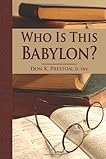 Ancient Near Eastern Thought and the Old Testament: Introducing the Conceptual World of the Hebrew Bible
Ancient Near Eastern Thought and the Old Testament: Introducing the Conceptual World of the Hebrew Bible by
John H. Walton
My rating:
4 of 5 stars
Much of the Old Testament seems strange to contemporary readers.
However, as we begin to understand how ancient people viewed the world,
the Old Testament becomes more clearly a book that stands within its
ancient context as it also speaks against it. John Walton provides here a
thoughtful introduction to the conceptual world of the ancient Near
East. Walton surveys the literature of the ancient Near East and
introduces the reader to a variety of beliefs about God, religion, and
the world. In helpful sidebars, he provides examples of how such studies
can bring insight to the interpretation of specific Old Testament
passages. Students and pastors who want to deepen their understanding of
the Old Testament will find this a helpful and instructive study.
I bought this book thinking it was dealing with one thing, only to find when I started reading, that it was not. It is a comparative type study of the Old Testament and the surrounding near Eastern teachings. Many "scholars" today say the OT has borrowed its "stories" from other pagan nations, and that there is nothing really new or unique about the religion contained within. This book seeks - and accomplishes - proving this to be incorrect.
There was much in this book that kind of went over my head, and was more technical than I could fully grasp (either that or I wasn't fully able to concentrate while reading), but for the most part the book is filled with details of surrounding nations that really shed some new light on our understanding of the OT text. Some of the most striking revelations to me were looking at the first four of the ten commandments.
After understanding how the other nations looked at deity, worshiped their deity, and made images of them - and what those images were there for - it really altered my understanding of why God said what he said in the commandments. My understanding of the intent and purpose of those commands has changed, not drastically or in direct opposition of what I believed on the topic, but I understand better what they were specifically worded to address, and how some of my application of them was not necessarily accurate.
Another very interesting section was in dealing with the temples of a deity. Everything from how they were created, what they suggested, how they were described, and what took place there, it really gave some major depth to a lot of things; things that I really need to study further after re-reading part of this book again.
Other than that highlight, just understanding some of the complex things the other nations believed, and yes, even seeing how some of that was common in the OT belief system, just gave depth and detail to my understanding of the ancient OT world. I think books like this should be required reading for all pastors; in order to bring the OT to life in sermons, they need to understand the culture and issues that surrounded the writings of it. Likewise for the NT text, the culture, context, and local issues - audience relevance - is the key to understanding the text.
So, I gleaned quite a bit from this book, but would love to take the time for a more detailed reading to grasp more. I recommend this book as a great source of study for a better grasp of OT thought and practice.
View all my reviews















